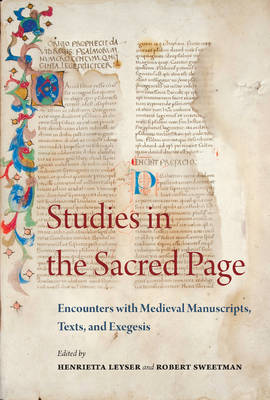
- Afhalen na 1 uur in een winkel met voorraad
- Gratis thuislevering in België vanaf € 30
- Ruim aanbod met 7 miljoen producten
- Afhalen na 1 uur in een winkel met voorraad
- Gratis thuislevering in België vanaf € 30
- Ruim aanbod met 7 miljoen producten
Studies in the Sacred Page: Encounters with Medieval Manuscripts, Texts, and Exegesis
A Book of Essays in Honour of Lesley Smith
Henrietta LeyserOmschrijving
Humanistic scholarship has always started on its journey to the sources, ad fontes, forearmed with the knowledge that on arrival it is essential to stop, to attend and to listen, before any analysis of the anticipated discovery can begin. Attentive letting-be, letting-go, and letting-say has marked Lesley Smith's scholarship from beginning to end, and this capacity informs the essays that make up this volume in her honour.
Several of the essays gathered here take as their starting point questions Lesley Smith had prompted the reader to consider. What, for example, might the look and contents of extant Bible manuscripts have contributed to discerning the canon of Scripture as it was understood in the twelfth century? What can we learn about the living history or Wirkungsgeschichte of Bruno of Wurzburg's eleventh-century commentary on the Psalms by examining its surviving manuscript witnesses? What can we discover about the authorship of the earliest strata of the Glossa ordinaria if we attend to the presence of anti-Jewish polemic in them?
Other essays ask similarly fecund questions. What do we grasp of Abelard's motive for writing a Romans commentary from careful analysis of his own interrogative modus operandi? What can we learn of cultural exchange between twelfth-century Christians and Jews from a study of the representations of the Temple and Holy Land included in Richard of St Victor's In visionem Ezechielis?
Out of all this questioning there emerges a sense of the living character of scholastic scriptural interpretation, plural in its methods and intentions but able also to be modulated by later readers and scribes to take on new identities and meanings. Collectively, the essays demonstrate how attention to such questions informs a range of scholarly disciplines, reflecting and extending Lesley Smith's own modes of knowing, and paying tribute to a friend and colleague much admired.
Specificaties
Betrokkenen
- Auteur(s):
- Uitgeverij:
Inhoud
- Aantal bladzijden:
- 292
- Taal:
- Engels
- Reeks:
Eigenschappen
- Productcode (EAN):
- 9780888448347
- Verschijningsdatum:
- 25/10/2022
- Uitvoering:
- Hardcover
- Formaat:
- Genaaid
- Afmetingen:
- 156 mm x 230 mm
- Gewicht:
- 616 g

Alleen bij Standaard Boekhandel
Beoordelingen
We publiceren alleen reviews die voldoen aan de voorwaarden voor reviews. Bekijk onze voorwaarden voor reviews.











